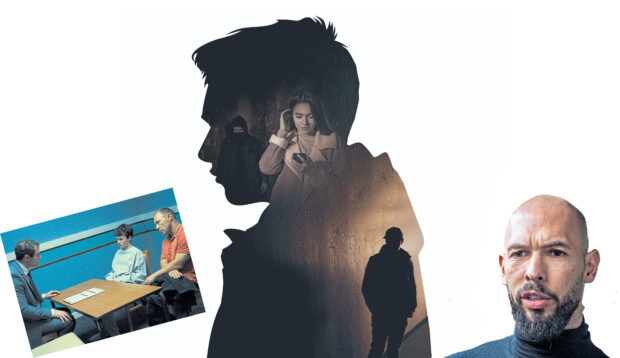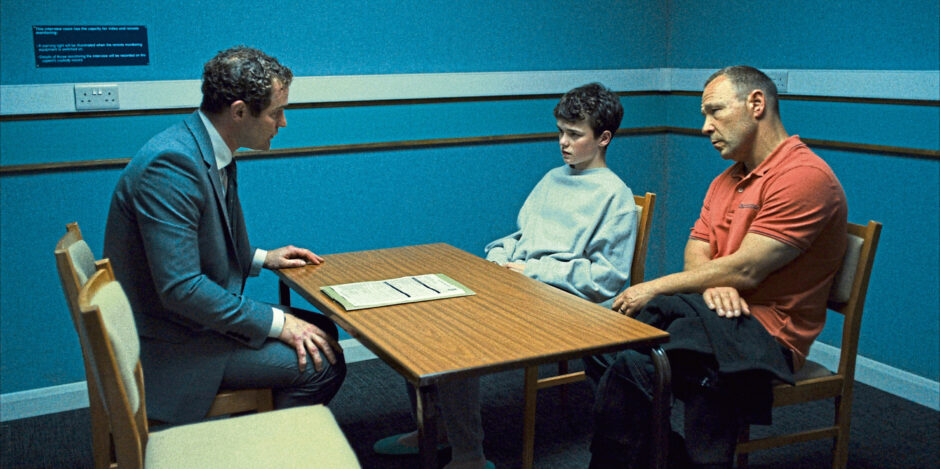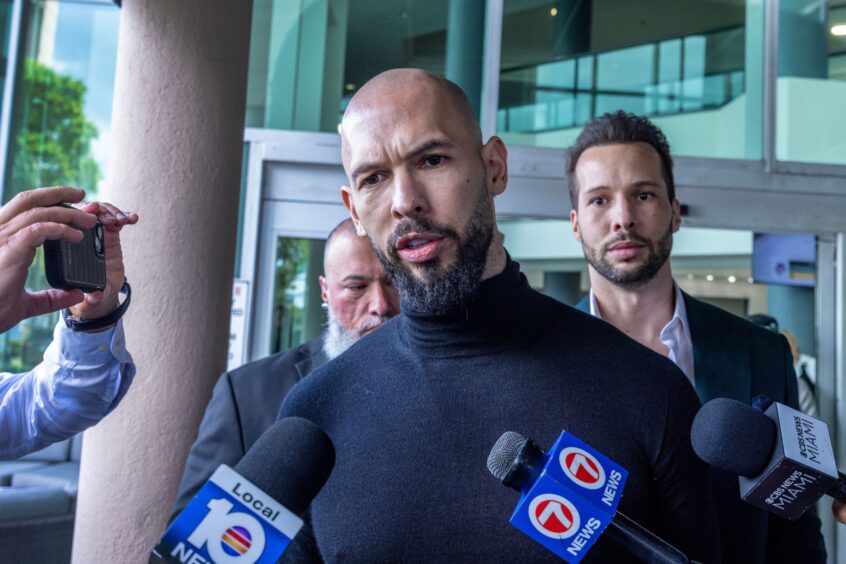
In front of her pupils, a teacher recoils from a barrage of abuse. A teenage boy shouts that she’s “a f***ing pig” while others heckle her with animal noises.
In another school, a teacher tells a male student to stop disrupting a lesson. Sneering, he tells his pals: “Just because she’s got her period…”
Elsewhere, a group of boys gloat as they hand in essays on why women should all be the property of men.
These shocking examples of sexism come from new research, revealed in today’s Sunday Post, that exposes the growing misogyny in Scotland’s classrooms.
Incel ideology and sexism in schools
With female teachers and pupils facing frequent abuse and sexual taunts, academics and campaigners have highlighted the proliferation of incel ideology. Short for involuntarily celibate, it is the warped belief that blames women for men’s failings and disappointments, and whose followers seek payback through hatred and violence.
In recent weeks, incels have gained renewed prominence thanks to Netflix mini-series Adolescence in which 13-year-old Jamie Miller (played by Owen Cooper) is accused of killing classmate Katie (Emilia Holliday) having apparently been radicalised online.
Around the world, young men exposed to incel dogma have committed horrific acts of mass murder.
Although such violence seems unthinkable in Scotland, a number of Scots – as revealed in last week’s Post – have already been reported to the Prevent anti-terrorism scheme because of their extreme incel views.
We previously reported how a Sunday Post survey revealed three out of five girls have endured some form of sexual harassment, with one in five girls being physically assaulted.
Now one expert has warned incel extremism and the epidemic of anti-women attitudes in schools are directly linked – and must be challenged.
Dr Emma Flynn, of Glasgow University, whose research covers gender violence and media, said: “The Prevent scheme functions as a filter for extremism – and the boys or young men who have been referred to it have expressed views far, far, beyond the boundaries of even the normative misogyny seen in society.
“It’s deeply worrying – but not entirely surprising, as social media has intensified the spread of misogynistic attitudes.”
‘Young women say they’re afraid’
Agnes Tolmie, chair of the Scottish Women’s Convention (SWC), added: “Young women say they’re afraid of the boys in their school. One was pushed down a flight of stairs by a boy who did it because he ‘didn’t like’ girls or women. Young men believe incel culture has given them permission to behave in these extreme ways.”
The term incel describes someone unable to find a romantic or sexual partner despite wanting one. In recent years, a radicalised sub-culture has spread across blogs and forums collectively known as the “manosphere” – with incels’ frustration channelled into hatred for women.
In 2014, Elliot Rodger wrote he was consumed with hate because he couldn’t form intimate relationships – then shot dead six students in California.
Incel Alek Minassian later killed 11 people in Canada by ploughing a rented van onto a busy pavement.
Closer to home, 22-year-old Jake Davison, from Plymouth in England, discussed the incel movement on social media and spoke of being “defeated by life” – before shooting dead five people in 2021.
And, in Scotland, Gabrielle Friel, from Edinburgh, was found guilty in 2020 of stockpiling weapons including a crossbow and a machete. The 22-year-old said he empathised with incel killers and fantasised about mass shooting.
Adolescence
Edgy drama Adolescence highlights incel terminology used by young people – but baffling to many adults – including emojis and references to the blue or red pill, said to represent a choice between remaining in blissful ignorance (blue) or accepting the painful reality (red) of the incel worldview.
Black pill refers to believing a society biased against men cannot be changed, with blackpilled incels encouraged to kill themselves or else “go ER” – by committing an act of violence like Elliot Rodger.
Although it’s easy to imagine TV is exaggerated for dramatic effect, The Post last week found countless current examples of young men on anonymous online forums discussing their despair and rage in the same, troubling terms.
One 19-year-old wrote: “Never been in a relationship before. I’ve completely lost hope in myself. For the past year I’ve been getting sucked more and more into the blackpill and incel ideology.”
Another said: “A strong hatred is growing inside of me – a hatred for couples and, honestly, women in general.”
Andrew Tate influence
Adolescence also references Andrew Tate, a self-proclaimed misogynist and notorious “manfluencer”.
Currently being investigated in Romania, America and Britain over rape and human trafficking allegations, the 38-year-old former kick-boxer continues to share his brand of toxic masculinity with over 10 million online followers.
Last week he reposted a feminist message to “Respect women today (and everyday)” – alongside a dismissive single-word response: “Nah.”
He also wrote: “Emotional intelligence doesn’t exist. It’s what women cite when you won’t do whatever stupid s**t they want.” A new survey by the NASUWT teaching union confirms the impact of online bile in Scotland’s classrooms.
One teacher said: “Male pupils have been hugely influenced by misogynistic influencers like Andrew Tate and there is a definite shift in disparaging, disdainful behaviour of boys as young as 12 or 13 towards female members of staff.
“In an English class of 28 S2 pupils, four boys opted, despite discouragement, to write a persuasive essay on why Andrew Tate is the G.O.A.T. (Greatest of All Time) – including praise of his view that women are a man’s property. This rhetoric and low view of women plays out in the diminishing respect many of my female colleagues are now shown.”
Dr Flynn said: “Misogyny is not new. But what is new is manfluencers like Andrew Tate openly using women and girls as scapegoats for the problems men are facing, boasting about hating women and girls, and proudly identifying as misogynists.”
Teachers targeted
The NASUWT research found female teachers are targeted more frequently than male counterparts, with 37% of female teachers facing verbal abuse several times a week, compared to 18% of men.
Alarmingly, 18% of women teachers experienced physical violence several times a week, compared to 6% of male teachers.
Since Adolescence hit the screens, debate has raged about how to tackle both incel extremism and widespread misogyny – with suggestions including a ban, or limit, on accessing social media for young people, and the appointment of a government Minister for Men.
For Stephen Graham, who co-wrote the series and also plays Jamie’s father, the hope is that parents become more “mindful” of “external influences” that might be shaping their children’s lives – including the “woman-hating” ideologies in the “manosphere”.
Dr Flynn, meanwhile, says eliminating extremism begins with zero tolerance for all misogyny.
She said: “Entrenched misogyny must be addressed at an institutional level – by the state, schools, universities, in organised religion, within the family – and at an interpersonal level among friends, colleagues, and partners.
“It’s incumbent on each of us not to accept the casual misogyny which exists on the same spectrum as more extreme and severe acts of violence against women and girls.”
Meanwhile, the SWC backs calls for misogyny to be criminalised – but Tolmie explained: “We need role models that guys admire – footballers, rugby players, film stars, fathers and brothers – to stand up and say it’s not acceptable to talk about women and girls in that way.
“We support misogyny being recognised as hate crime – but it would be better to persuade, encourage and educate young men to amend their behaviour and participate in society like decent human beings.”
On the frontline
Catcalled and humiliated. I am not alone
Scottish pupil Megan, 17, says: “I go to a good school, but despite that, gender-based violence (GBV) is part of the student culture. Girls face a litany of abusive and misogynistic language from male pupils each day in school. As we walk through the corridors, boys shout obscene words at us.
“Between classes I’ve been catcalled and humiliated by boys. It made me feel like I wasn’t even a person. I am not alone.
“This abuse is happening in classrooms too. Among younger years, comments like ‘go back to the kitchen’ are startlingly common. They reinforce the idea that women and girls don’t belong in education and that we don’t deserve respect. Many boys are extremely dismissive of women’s experiences. A friend told how while watching a documentary about women’s experiences of GBV, a boy shouted ‘no one would rape her!’.
“The impact of social media is huge. Some boys are struggling to draw the line between pornography and reality. Girls overhear comments like ‘‘she should take it like a b***h’ in reference to other teenage girls.
“Adolescence is a work of fiction but the scenes in it are part of our reality.”
World view: Aussie kids set for social media ban
Australia is preparing to become the first country to impose a national social media ban on children under 16.
Unlimited access to social media has been identified as one of the factors driving the rise of the incel culture.
Legislation will come into force by the end of the year. Tech firms face fines of up to AU$49.5 million (£25 million) if they flout the rules.
France and several US states, including Florida and Texas, have passed laws to restrict social media access for minors.
But the Australian legislation, which was passed in November, aims to remove children from sites including TikTok, Instagram, Facebook and Twitch. YouTube, which is widely used in schools, is exempt.
What is not yet clear is how they will do it. An Australian survey revealed how easy it is for children to access social media by giving a false date of birth.
In Scotland headteachers have been given government backing to introduce mobile phone bans in schools. Under new guidance, pupils can be required to hand over devices before classes or banned from using them on school trips in a bid to cut down on distracting notifications or filming bullying.

Enjoy the convenience of having The Sunday Post delivered as a digital ePaper straight to your smartphone, tablet or computer.
Subscribe for only £5.49 a month and enjoy all the benefits of the printed paper as a digital replica.
Subscribe © Netflix
© Netflix © CRISTOBAL HERRERA-ULASHKEVICH/EP
© CRISTOBAL HERRERA-ULASHKEVICH/EP